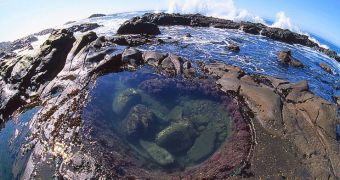In a new study, experts have determined that organisms cannot adapt to the rapid pace at which our world is warming. The researchers say that even less complex lifeforms – which pass through multiple generations in relatively-short time frames – have a very difficult time doing so.
In past investigations, researchers proposed that geographically-widespread species had a lot of genetic material to work with, and that this would help them withstand the effects of global warming.
But the new research, which was carried out on the widespread tidal pool copepod Tigriopus californicus, found that this is simply not true. The work included a first-of-its-kind lab experiment.
T. californicus can be found on coastlines from Alaska to Mexico, which means that it can tolerate a wide range of temperatures. But experts now showed that the organisms are living at the edge of their capabilites, and that they cannot adapt to the rate at which the Earth is warming.
Our planet is getting hotter with every passing decade, and evolutionary biologists have been wondering whether species can adapt to this pace for years. “This is a question a lot of scientists have been talking about,” explains Eric Sanford, the coauthor of the new work.
In order to find an answer, the research team collected 8 T. californicus samples from Oregon to Baja California, Mexico. The tiny, shrimp-like creatures were bred inside the lab for 10 generations, while researchers steadily increased the temperatures the species was subjected to.
According to Sanford, an associate professor of evolution and ecology at the University of California in Davis (UCD) Bodega Marine Laboratory, the species is unable to adapt itself to climate change.
UCD graduate student and study first author Morgan Kelly analyzed the animal, and tried to select for individuals that were most resistant to heat in each new generation. Over 10 generations, heat tolerance increased by less than one degree Fahrenheit, or half a degree Celsius.
But these were the best-of T. californicus. The majority of the species reached an evolutionary plateau long before they improved their heat tolerance by the aforementioned amount.
“It's been assumed that widespread species have a lot of genetic capacity to work with, but this study shows that may not be so,” explains UCD professor of evolution and ecology Rick Grosberg, who is also a coauthor of the new research paper.
“The critical point is that many organisms are already at their environmental limits, and natural selection won't necessarily rescue them,” Grosberg concludes.
The work, which was funded by the US National Science Foundation (NSF), is published in the June 8 issue of the esteemed scientific journal Proceedings of the Royal Society B.

 14 DAY TRIAL //
14 DAY TRIAL //